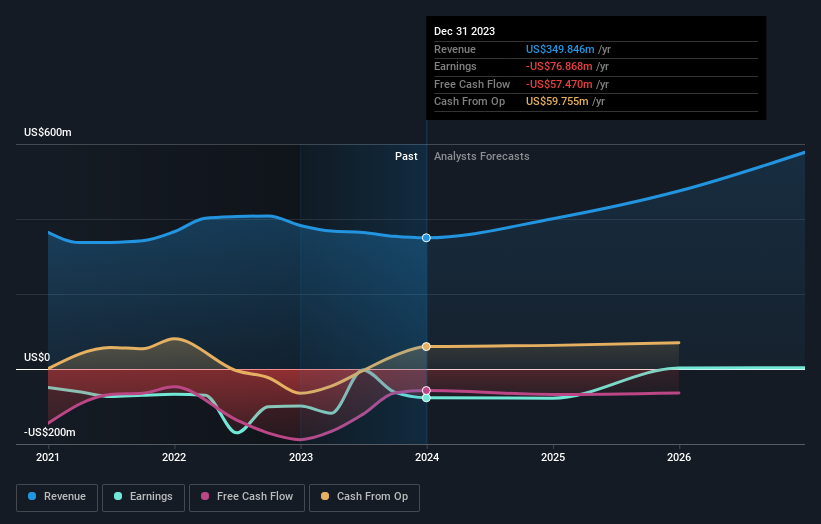Gogoro Inc.'s (NASDAQ:GGR) top owners are retail investors with 54% stake, while 22% is held by private companies
Key Insights
The considerable ownership by retail investors in Gogoro indicates that they collectively have a greater say in management and business strategy
A total of 25 investors have a majority stake in the company with 46% ownership
Every investor in Gogoro Inc. (NASDAQ:GGR) should be aware of the most powerful shareholder groups. The group holding the most number of shares in the company, around 54% to be precise, is retail investors. Put another way, the group faces the maximum upside potential (or downside risk).
And private companies on the other hand have a 22% ownership in the company.
Let's delve deeper into each type of owner of Gogoro, beginning with the chart below.
See our latest analysis for Gogoro
What Does The Institutional Ownership Tell Us About Gogoro?
Institutional investors commonly compare their own returns to the returns of a commonly followed index. So they generally do consider buying larger companies that are included in the relevant benchmark index.
As you can see, institutional investors have a fair amount of stake in Gogoro. This implies the analysts working for those institutions have looked at the stock and they like it. But just like anyone else, they could be wrong. It is not uncommon to see a big share price drop if two large institutional investors try to sell out of a stock at the same time. So it is worth checking the past earnings trajectory of Gogoro, (below). Of course, keep in mind that there are other factors to consider, too.
Hedge funds don't have many shares in Gogoro. Gold Sino Assets Limited is currently the largest shareholder, with 22% of shares outstanding. The second and third largest shareholders are Far Eastern International Bank, Asset Management Arm and Hok-Sum Luke, with an equal amount of shares to their name at 5.0%. Hok-Sum Luke, who is the third-largest shareholder, also happens to hold the title of Chairman of the Board.
A deeper look at our ownership data shows that the top 25 shareholders collectively hold less than half of the register, suggesting a large group of small holders where no single shareholder has a majority.
While studying institutional ownership for a company can add value to your research, it is also a good practice to research analyst recommendations to get a deeper understand of a stock's expected performance. Quite a few analysts cover the stock, so you could look into forecast growth quite easily.
Insider Ownership Of Gogoro
While the precise definition of an insider can be subjective, almost everyone considers board members to be insiders. Company management run the business, but the CEO will answer to the board, even if he or she is a member of it.
Most consider insider ownership a positive because it can indicate the board is well aligned with other shareholders. However, on some occasions too much power is concentrated within this group.
Our information suggests that insiders maintain a significant holding in Gogoro Inc.. It has a market capitalization of just US$525m, and insiders have US$61m worth of shares in their own names. We would say this shows alignment with shareholders, but it is worth noting that the company is still quite small; some insiders may have founded the business. You can click here to see if those insiders have been buying or selling.
General Public Ownership
The general public, who are usually individual investors, hold a substantial 54% stake in Gogoro, suggesting it is a fairly popular stock. With this amount of ownership, retail investors can collectively play a role in decisions that affect shareholder returns, such as dividend policies and the appointment of directors. They can also exercise the power to vote on acquisitions or mergers that may not improve profitability.
Private Company Ownership
It seems that Private Companies own 22%, of the Gogoro stock. It might be worth looking deeper into this. If related parties, such as insiders, have an interest in one of these private companies, that should be disclosed in the annual report. Private companies may also have a strategic interest in the company.
Next Steps:
While it is well worth considering the different groups that own a company, there are other factors that are even more important.
Many find it useful to take an in depth look at how a company has performed in the past. You can access this detailed graph of past earnings, revenue and cash flow.
But ultimately it is the future, not the past, that will determine how well the owners of this business will do. Therefore we think it advisable to take a look at this free report showing whether analysts are predicting a brighter future.
NB: Figures in this article are calculated using data from the last twelve months, which refer to the 12-month period ending on the last date of the month the financial statement is dated. This may not be consistent with full year annual report figures.
Have feedback on this article? Concerned about the content? Get in touch with us directly. Alternatively, email editorial-team (at) simplywallst.com.
This article by Simply Wall St is general in nature. We provide commentary based on historical data and analyst forecasts only using an unbiased methodology and our articles are not intended to be financial advice. It does not constitute a recommendation to buy or sell any stock, and does not take account of your objectives, or your financial situation. We aim to bring you long-term focused analysis driven by fundamental data. Note that our analysis may not factor in the latest price-sensitive company announcements or qualitative material. Simply Wall St has no position in any stocks mentioned.


